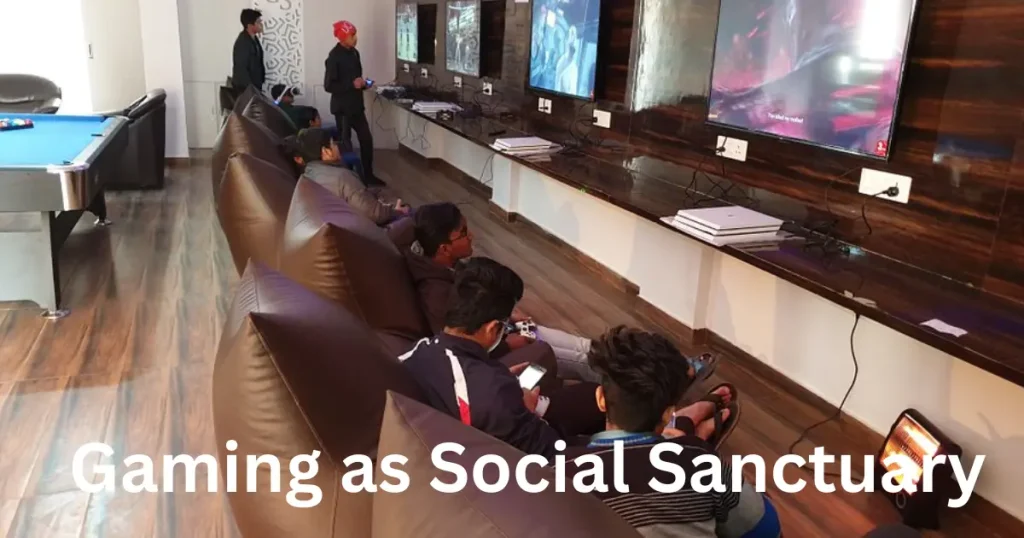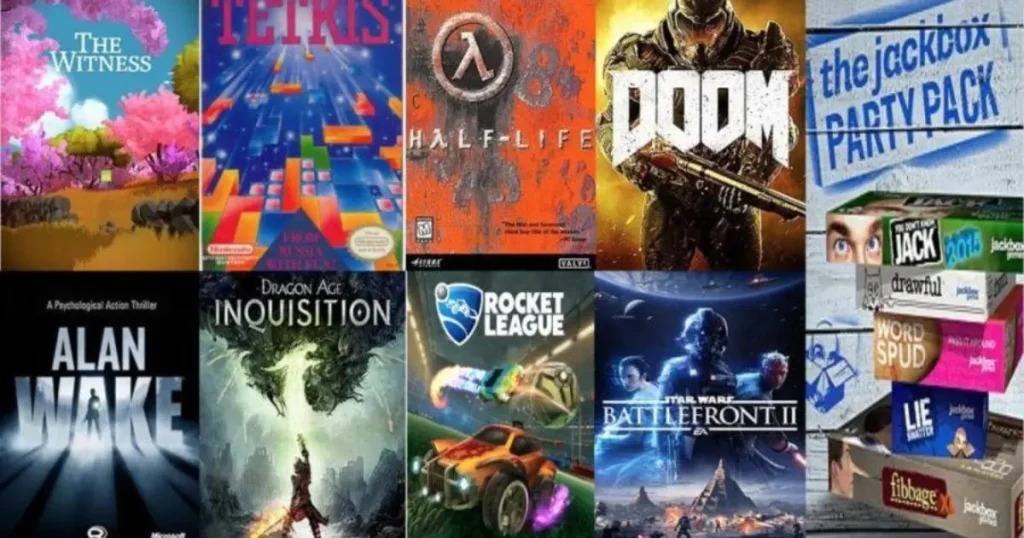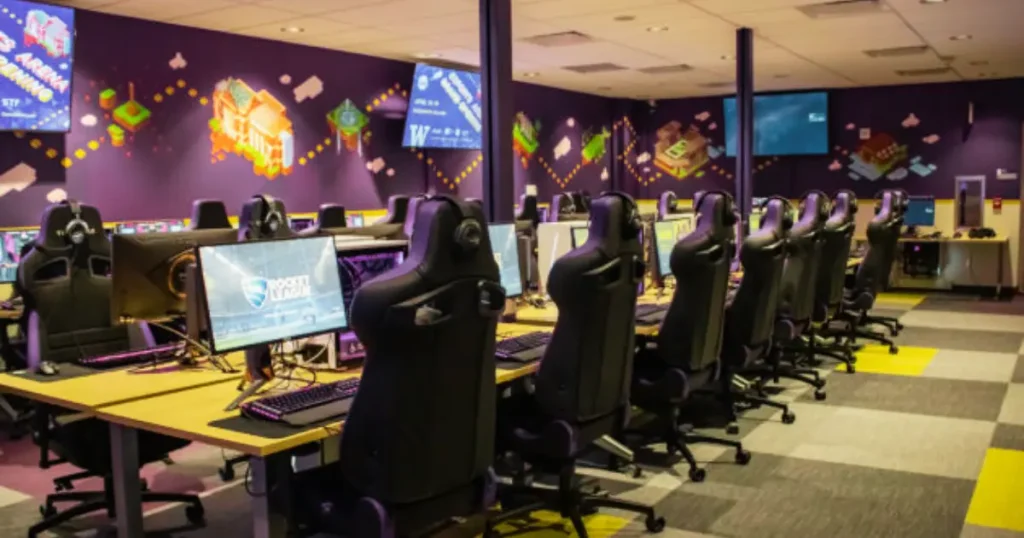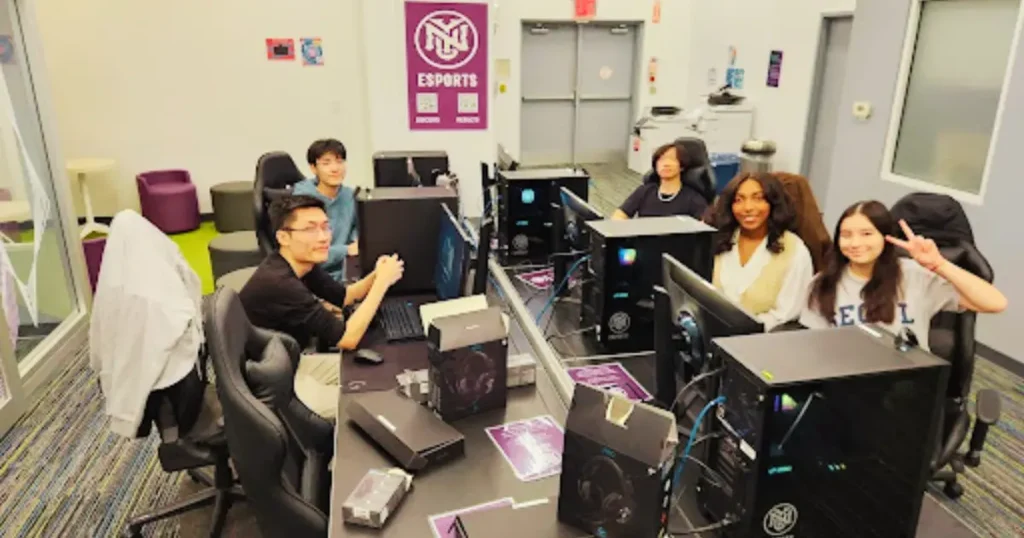
Introduction: A New Chapter for the Former First Son
Starting college is a significant milestone for any young adult, but when you’re the son of a former president, the experience comes with unique challenges. Barron Trump, the youngest son of former President Donald Trump, has reportedly found an ingenious way to navigate campus life at New York University while maintaining a low profile. According to those familiar with his college experience, gaming has become Barron’s preferred method of socializing, allowing him to build friendships and connect with peers away from the public eye.
As someone who has covered both politics and gaming culture for years, I’ve found the intersection of these worlds increasingly fascinating. The digital realm offers something particularly valuable to those seeking privacy in an age of constant scrutiny: the opportunity to connect based on shared interests rather than family backgrounds or public personas.
In this in-depth exploration, we’ll examine how Barron Trump has reportedly embraced gaming culture at NYU, the broader trend of digital socialization among Gen Z, and what this tells us about the changing nature of college social life for high-profile individuals. Drawing on insights from gaming experts, college counselors, and privacy specialists, we’ll provide a comprehensive look at this modern approach to building community.
The Challenges of Public Life for Presidential Children
Historical Context: Growing Up in the Spotlight
Presidential children have long faced unusual circumstances while navigating their formative years. From Chelsea Clinton to the Obama daughters, Malia and Sasha, these young people have had to develop strategies for maintaining some semblance of normalcy despite their high-profile status.

Dr. Elizabeth Mitchell, a historian specializing in presidential families, explains: “Throughout American history, children of presidents have faced intense scrutiny. In earlier eras, this might have been limited to newspaper coverage, but in today’s digital age, the challenges are exponentially greater with social media and 24-hour news cycles.”
Barron Trump’s experience has been particularly unique. Having lived in Trump Tower until age 11 and then the White House during his father’s presidency, he has grown up under extraordinary security measures and public attention. Now as a college student, he faces the delicate balance of experiencing normal university life while managing his family’s controversial political legacy.
Privacy Concerns in the Digital Age
For someone like Barron, whose father remains one of the most polarizing political figures in American history, privacy concerns extend beyond mere preference and into the realm of personal security.
“High-profile individuals attending universities face a double-edged sword,” notes Catherine Rodriguez, a former Secret Service agent who specialized in protecting public figures. “They need the freedom to form genuine connections and have authentic experiences, but must remain vigilant about potential security risks or those who might exploit their relationships for personal gain or media exposure.”
In this context, gaming offers a particularly attractive solution. Gaming communities typically organize around shared interests and skills rather than personal backgrounds or family connections. Usernames and avatars provide a layer of separation between one’s gaming identity and real-world persona.
Gaming as Social Sanctuary
The Appeal of Digital Socialization
The gaming world represents an ideal social environment for someone in Barron Trump’s position. Dr. James Chen, a psychologist specializing in digital interactions, explains: “Online gaming creates what we call ‘psychological safety’ for many young people. In these spaces, you’re judged primarily on your contributions to the game—your skill, teamwork, and communication—rather than external factors like family background or appearance.”

This form of interaction allows for authentic connections to form organically, based on shared experiences rather than preconceived notions. For a young adult navigating the complexities of being a former first son, this represents a significant advantage.
According to gaming industry analyst Samantha Winters: “Gaming communities develop their own internal status hierarchies based on skill, contribution, and community participation. Previous social status often becomes irrelevant in these spaces.”
Popular Gaming Platforms Among College Students
While specific details about Barron Trump’s gaming preferences remain private (as they should), we can examine the platforms most popular among college-aged gamers that provide similar social benefits.

Discord has emerged as the communication platform of choice for many gamers, allowing for voice chat during gameplay and text-based conversations between sessions. What began as a gaming-focused tool has evolved into a broader social platform where many college students maintain friend groups and communities.
Multiplayer games like Valorant, League of Legends, and Call of Duty offer team-based experiences that naturally foster collaboration and relationship-building. Strategy games such as Civilization VI and Age of Empires provide longer-format experiences where players can engage in diplomacy and complex interactions.

Ryan Johnson, an esports coach at the collegiate level, observes: “The beauty of these platforms is that they create natural conversation starters and shared experiences. Two people who might have little in common in other contexts can build meaningful connections through overcoming in-game challenges together.”

NYU’s Gaming Culture and Communities
Campus Gaming Organizations
New York University, like many modern educational institutions, has embraced gaming as a legitimate form of student activity and community-building. The university hosts several gaming-related organizations that provide structured environments for students to connect.

NYU Game Center is one of the most prominent examples, offering both academic programs in game design and community spaces for recreational gaming. The university also has an esports team that competes against other schools in various competitive titles.

“University gaming spaces have evolved dramatically in recent years,” notes Professor Maria Gonzalez, who studies digital communities in higher education. “What was once considered a niche activity has become mainstream, with dedicated facilities, faculty advisors, and even scholarship opportunities.”
These institutional structures provide natural entry points for students seeking gaming communities, regardless of their background or personal circumstances.
Private Gaming Groups
Beyond official organizations, many NYU students form private gaming groups organized through Discord servers, group chats, and informal networks. These smaller communities often provide more intimate social experiences and greater privacy controls.
“Campus gaming communities frequently develop organically among students living in the same residence halls or studying similar subjects,” says Dylan Park, president of a college gaming association. “These micro-communities can be particularly valuable for students who prefer smaller social settings or have privacy concerns.”
For someone like Barron Trump, these smaller gaming circles potentially offer the ideal balance: genuine social connection without the exposure that comes with larger campus organizations or public events.
The Benefits of Gaming as a Social Platform
Building Genuine Connections
The structure of multiplayer gaming naturally encourages teamwork, communication, and trust-building—all essential elements for developing meaningful friendships. Dr. Alicia Martinez, a researcher studying digital socialization patterns, explains: “Cooperative gaming experiences activate the same psychological reward mechanisms as traditional team activities. Players learn to rely on each other, communicate effectively, and celebrate shared accomplishments.”
This foundation can transition into deeper connections that extend beyond the game itself. Many gamers report that their online friendships eventually evolve into multifaceted relationships that include discussions about personal lives, academic interests, and other shared hobbies.
“What often starts as a purely game-focused interaction can develop into much more substantial friendships,” notes Martinez. “As trust builds, conversations naturally expand beyond game strategies to include personal interests, challenges, and aspirations.”
Skill Development Through Gaming
Beyond social benefits, gaming offers valuable skill development opportunities that complement academic learning. Modern video games frequently involve complex problem-solving, strategic planning, resource management, and teamwork.
Dr. William Chen, who researches cognitive development in digital environments, points out: “Many popular games today require sophisticated decision-making skills, statistical analysis, and planning several moves ahead. These cognitive challenges have demonstrable benefits for brain development and can translate to academic performance.”
For college students navigating competitive academic environments, these cognitive benefits represent an additional advantage of gaming as a social activity.
Privacy Strategies in the Digital Age
Maintaining Digital Boundaries
For high-profile individuals like Barron Trump, establishing clear digital boundaries becomes essential for healthy socialization. Privacy experts recommend several strategies that anyone in a similar position might employ:

- Separate gaming identities from public personas: Using usernames unconnected to real names or recognizable references
- Carefully vetting gaming communities: Starting with smaller trusted groups before expanding networks
- Utilizing privacy settings: Taking advantage of platform-specific tools to control information sharing
- Being selective about voice chat: Choosing when to use voice communications versus text-based interaction
“The most successful approach combines technological safeguards with thoughtful decision-making about whom to trust,” advises privacy consultant Michael Barnes. “Building a smaller circle of trusted connections first provides a foundation for gradually expanding one’s network.”
The Role of Trusted Friends
Having a core group of trusted friends who understand privacy concerns can be invaluable for high-profile individuals. These friends often serve as bridges to broader social circles, helping to navigate potential risks while facilitating normal social experiences.
“In my work with public figures, I’ve observed that having two or three completely trusted connections often makes all the difference,” notes Dr. Jennifer Williams, a psychologist specializing in high-profile clients. “These core relationships provide both emotional support and practical assistance in building wider social networks.”
For college students with privacy concerns, roommates and classmates often become these trusted connections, serving as sounding boards and social facilitators.
Gaming and Academic Life: Finding Balance
Time Management Challenges
While gaming offers valuable social benefits, balancing gaming with academic responsibilities remains crucial for college students. NYU, like most prestigious universities, presents a demanding academic environment that requires dedicated study time and consistent effort.
Academic advisor Sarah Thompson recommends a structured approach: “The most successful students I work with treat gaming as a scheduled activity rather than a default pastime. They allocate specific time blocks for gaming and maintain clear boundaries around study hours.”
This disciplined approach allows students to enjoy the social benefits of gaming while ensuring academic performance doesn’t suffer. For someone navigating both college challenges and public attention, this structure can provide valuable stability.
Gaming Communities Supporting Academic Success
Interestingly, gaming communities often evolve to support academic goals rather than detract from them. Many college gaming groups establish shared study sessions, academic accountability partnerships, and even course-specific help channels.
“What we’ve observed in our research is that gaming communities frequently develop norms that prioritize academic success,” explains education researcher Dr. Robert Chen. “Members celebrate good grades and support each other through academic challenges, creating positive peer pressure.”
This integration of gaming and academic values creates a healthy ecosystem where social connections reinforce educational goals rather than competing with them.
The Evolution of College Socialization
Changing Patterns in Campus Social Life
The traditional vision of college social life—centered around fraternity parties, campus events, and face-to-face club meetings—has evolved significantly in recent years. This shift began before the pandemic but accelerated dramatically during periods of remote learning.
“Today’s college students approach socialization very differently than previous generations,” observes Dr. Victoria Hughes, a sociologist studying youth culture. “They move fluidly between digital and physical spaces, building relationships that exist across multiple platforms simultaneously.”
This evolution has created more diverse pathways for social integration, benefiting students with unconventional circumstances or specific privacy needs.
The Normalization of Digital Friendships
Perhaps most importantly, digital friendships have become normalized among Gen Z students, who see little distinction between connections formed online versus in-person. This acceptance removes much of the stigma previously associated with primarily digital relationships.
“For current college students, the idea that ‘online friends aren’t real friends’ seems antiquated,” notes youth culture researcher Alexis Washington. “They recognize the authenticity and value of connections regardless of whether they originated in physical or digital spaces.”
This shift in perspective benefits all students who find digital socialization more accessible, comfortable, or practical than traditional alternatives.
Looking Forward: The Future of Privacy and Socialization
Technological Trends Supporting Privacy
As technology continues to evolve, new tools are emerging that support privacy while enabling authentic connection. Developments in encryption, identity verification, and privacy-focused platforms are creating more secure environments for digital interaction.
Tech analyst Marcus Johnson explains: “We’re seeing significant innovation in what we call ‘privacy-preserving social technologies.’ These platforms allow users to control exactly what personal information is shared, with whom, and under what circumstances.”
These advances promise to further improve options for high-profile individuals seeking genuine connections without compromising privacy or security.
Broader Cultural Shifts
The experiences of public figures like Barron Trump reflect broader cultural changes in how we understand privacy, identity, and connection. As digital natives come of age, society is developing more nuanced perspectives on the relationship between public and private life.
“What we’re witnessing is a fundamental renegotiation of privacy norms,” observes digital ethicist Dr. Sarah Chen. “Younger generations are pioneering approaches that allow for authentic connection while maintaining boundaries around personal information and identity.”
These evolving norms benefit everyone navigating the complex landscape of modern social life, whether they have a famous last name or not.
Conclusion: Finding Authentic Connection in the Digital Age
The reported experience of Barron Trump at NYU reflects a broader reality: in today’s interconnected world, gaming and other digital platforms offer valuable alternative pathways to community and friendship. For individuals with privacy concerns, these digital spaces provide opportunities to connect based on shared interests and experiences rather than public personas or family backgrounds.
While specific details about Barron Trump’s personal life appropriately remain private, his reported approach offers an insightful window into how young adults are navigating the complex intersection of privacy, technology, and social connection. By engaging with peers through gaming, students in similar positions can build meaningful relationships while maintaining necessary boundaries.
As we look toward the future, these digital socialization strategies will likely become increasingly sophisticated, offering even more options for balancing privacy with authentic connection. The evolution of gaming from a solitary activity to a social platform represents just one example of how technology continues to transform the way we build community in the digital age.
For incoming college students facing unusual privacy challenges, the message is clear: meaningful connection remains possible, even in complex circumstances. Through thoughtful navigation of digital spaces and strategic boundary-setting, authentic relationships can flourish, creating the foundation for a fulfilling college experience regardless of one’s background or public profile.
Frequently Asked Questions
How do college students typically balance gaming and academics?
Successful students often treat gaming as a scheduled activity rather than default downtime. Setting specific time blocks for gaming while maintaining dedicated study hours helps maintain academic performance. Many gaming communities also establish norms that prioritize academic success, with members supporting each other’s educational goals.
What privacy features do gaming platforms offer?
Most modern gaming platforms include robust privacy options such as friends-only visibility, the ability to use pseudonyms instead of real names, control over voice and text chat permissions, and options to limit information sharing. Discord, a popular communication platform among gamers, offers private servers with invitation-only access and customizable security settings.
How has college socialization changed in recent years?
Today’s college students move fluidly between digital and physical social spaces. The pandemic accelerated existing trends toward digital socialization, with many friendships now developing across multiple platforms simultaneously. Gen Z students generally see little distinction between “online” and “offline” friendships, recognizing the authenticity of connections regardless of where they originated.
What games are most popular for social connection among college students?
Team-based games like Valorant, Apex Legends, and League of Legends remain popular for fostering collaboration and communication. Games with longer sessions such as Minecraft, strategy games, and MMORPGs often create deeper bonds through extended shared experiences. The specific games matter less than their ability to facilitate meaningful interaction and provide shared challenges.
How do universities support gaming communities?
Many universities now offer dedicated gaming spaces, official esports teams, game design programs, and gaming-focused student organizations. These institutional supports provide structured environments for students to connect through shared gaming interests, regardless of their background or personal circumstances.




